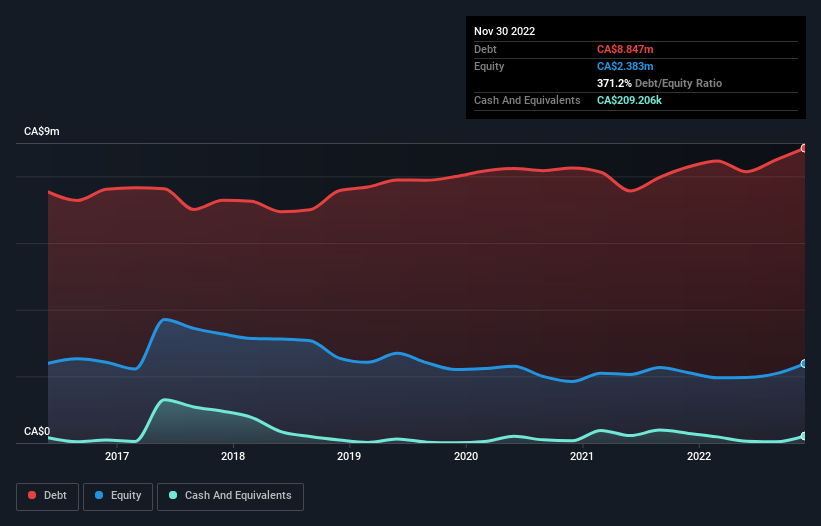David Iben put it well when he said, 'Volatility is not a risk we care about. What we care about is avoiding the permanent loss of capital.' So it seems the smart money knows that debt - which is usually involved in bankruptcies - is a very important factor, when you assess how risky a company is. Importantly, Earthworks Industries Inc. (CVE:EWK) does carry debt. But should shareholders be worried about its use of debt?
Why Does Debt Bring Risk?
Generally speaking, debt only becomes a real problem when a company can't easily pay it off, either by raising capital or with its own cash flow. If things get really bad, the lenders can take control of the business. While that is not too common, we often do see indebted companies permanently diluting shareholders because lenders force them to raise capital at a distressed price. Of course, debt can be an important tool in businesses, particularly capital heavy businesses. When we examine debt levels, we first consider both cash and debt levels, together.
Check out our latest analysis for Earthworks Industries
What Is Earthworks Industries's Debt?
As you can see below, at the end of November 2022, Earthworks Industries had CA$8.85m of debt, up from CA$8.29m a year ago. Click the image for more detail. However, it also had CA$209.2k in cash, and so its net debt is CA$8.64m.

How Strong Is Earthworks Industries' Balance Sheet?
According to the last reported balance sheet, Earthworks Industries had liabilities of CA$2.52m due within 12 months, and liabilities of CA$7.20m due beyond 12 months. On the other hand, it had cash of CA$209.2k and CA$6.3k worth of receivables due within a year. So its liabilities outweigh the sum of its cash and (near-term) receivables by CA$9.51m.
This deficit is considerable relative to its market capitalization of CA$15.1m, so it does suggest shareholders should keep an eye on Earthworks Industries' use of debt. Should its lenders demand that it shore up the balance sheet, shareholders would likely face severe dilution. There's no doubt that we learn most about debt from the balance sheet. But it is Earthworks Industries's earnings that will influence how the balance sheet holds up in the future. So when considering debt, it's definitely worth looking at the earnings trend. Click here for an interactive snapshot.
It seems likely shareholders hope that Earthworks Industries can significantly advance the business plan before too long, because it doesn't have any significant revenue at the moment.
Caveat Emptor
Over the last twelve months Earthworks Industries produced an earnings before interest and tax (EBIT) loss. Indeed, it lost CA$1.4m at the EBIT level. When we look at that and recall the liabilities on its balance sheet, relative to cash, it seems unwise to us for the company to have any debt. Quite frankly we think the balance sheet is far from match-fit, although it could be improved with time. Another cause for caution is that is bled CA$377k in negative free cash flow over the last twelve months. So to be blunt we think it is risky. The balance sheet is clearly the area to focus on when you are analysing debt. But ultimately, every company can contain risks that exist outside of the balance sheet. Case in point: We've spotted 6 warning signs for Earthworks Industries you should be aware of, and 4 of them don't sit too well with us.
If, after all that, you're more interested in a fast growing company with a rock-solid balance sheet, then check out our list of net cash growth stocks without delay.
Valuation is complex, but we're here to simplify it.
Discover if Earthworks Industries might be undervalued or overvalued with our detailed analysis, featuring fair value estimates, potential risks, dividends, insider trades, and its financial condition.
Access Free AnalysisHave feedback on this article? Concerned about the content? Get in touch with us directly. Alternatively, email editorial-team (at) simplywallst.com.
This article by Simply Wall St is general in nature. We provide commentary based on historical data and analyst forecasts only using an unbiased methodology and our articles are not intended to be financial advice. It does not constitute a recommendation to buy or sell any stock, and does not take account of your objectives, or your financial situation. We aim to bring you long-term focused analysis driven by fundamental data. Note that our analysis may not factor in the latest price-sensitive company announcements or qualitative material. Simply Wall St has no position in any stocks mentioned.
About TSXV:EWK
Earthworks Industries
A development stage company, focuses on providing waste disposal services.
Medium-low risk with imperfect balance sheet.
Market Insights
Community Narratives



